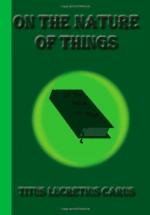|
This section contains 13,252 words (approx. 45 pages at 300 words per page) |

|
SOURCE: Minadeo, Richard. “The Great Design.” In The Lyre of Science: Form and Meaning in Lucretius's “De Rerum Natura,” pp. 31-54. Detroit: Wayne State University Press, 1969.
In the following excerpt, Minadeo attempts to explain the meaning of De rerum natura largely through study of its design and structure.
The biographical tradition on Titus Lucretius Carus is meager indeed, and those notices that are at all striking are both late in source and so compromising as to seem the work of a master ironist. As the result of a love potion, the tradition runs, the poet went insane, composed De Rerum Natura during intervals of lucidity and ultimately committed suicide. Save for the miracle of the poem itself, there is plainly nothing here that reflects the promised fruits of the Epicurean ethical life; and the fact that the poem was written, it must be stressed, is the one item...
|
This section contains 13,252 words (approx. 45 pages at 300 words per page) |

|


